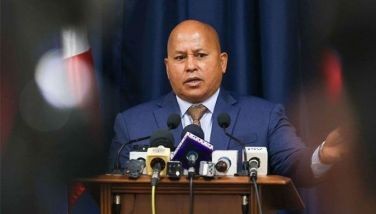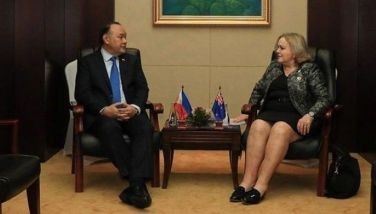Japanese traders threaten pullout

August 7, 2001 | 12:00am
Japanese businessmen threatened yesterday to pull out their investments from the country if the government continues to ignore their grievances.
The 200-strong Japanese Chamber of Commerce and Industry of the Philippines (JCCIP) is concerned about constantly changing investment policies, a militant labor force, high production costs, diminishing quality of locally produced goods, and the deteriorating peace and order situation.
Shoichi Kameyama, JCCIP president, told The STAR yesterday the best come-on for foreign investors is the success of foreign businesses already operating in the country.
"Unless impediments with which the Japanese businesses are confronted in the Philippines are solved, future and new Japanese investments will not come to the Philippines," he said.
Kameyama said China and other ASEAN countries like Thailand and Vietnam have been making remarkable strides in their economic development in recent years.
"There will be Japanese companies which will transfer their base of operations from the Philippines to other countries," he said.
Kameyama said there has been a marked improvement in the quality of products manufactured in China, Thailand and Vietnam.
"The serious issue confronting the Philippines is that these countries have considerably gained competitiveness in both cost and quality," he said.
Kameyama said newspapers in Japan have reported that investments originally intended for the Philippines and Indonesia are being diverted to Vietnam because of unstable peace and order and labor situations in the two countries.
"Foreign investment in Vietnam for the first six months of this year went up three times as much as the same period last year," he said. "Japanese investments alone for the same period jumped to 3.3 times as much as the corresponding period of last year."
Kameyama said there are fewer labor disputes in China, Thailand and Vietnam, and that these countries have a good peace and order situation and give investors consistent and reliable initiatives.
"In these countries, production cost is much lower than in the Philippines, and yet, products being made are of about the same quality compared to their counterparts being made in the Philippines," he said.
Kameyama said Philippine government officials must recognize the "gravity of the issues" and listen to the grievances of Japanese businessmen.
The Japanese businessmen relayed their "concerns" to government officials led by Trade and Industry Secretary Manuel Roxas II, Transportation and Communications Secretary Pantaleon Alvarez, Labor and Employment Secretary Patricia Sto. Tomas, and Public Works Secretary Simeon Datumanong during a mid-year briefing at the JCCIP.
The 200-strong Japanese Chamber of Commerce and Industry of the Philippines (JCCIP) is concerned about constantly changing investment policies, a militant labor force, high production costs, diminishing quality of locally produced goods, and the deteriorating peace and order situation.
Shoichi Kameyama, JCCIP president, told The STAR yesterday the best come-on for foreign investors is the success of foreign businesses already operating in the country.
"Unless impediments with which the Japanese businesses are confronted in the Philippines are solved, future and new Japanese investments will not come to the Philippines," he said.
Kameyama said China and other ASEAN countries like Thailand and Vietnam have been making remarkable strides in their economic development in recent years.
"There will be Japanese companies which will transfer their base of operations from the Philippines to other countries," he said.
Kameyama said there has been a marked improvement in the quality of products manufactured in China, Thailand and Vietnam.
"The serious issue confronting the Philippines is that these countries have considerably gained competitiveness in both cost and quality," he said.
Kameyama said newspapers in Japan have reported that investments originally intended for the Philippines and Indonesia are being diverted to Vietnam because of unstable peace and order and labor situations in the two countries.
"Foreign investment in Vietnam for the first six months of this year went up three times as much as the same period last year," he said. "Japanese investments alone for the same period jumped to 3.3 times as much as the corresponding period of last year."
Kameyama said there are fewer labor disputes in China, Thailand and Vietnam, and that these countries have a good peace and order situation and give investors consistent and reliable initiatives.
"In these countries, production cost is much lower than in the Philippines, and yet, products being made are of about the same quality compared to their counterparts being made in the Philippines," he said.
Kameyama said Philippine government officials must recognize the "gravity of the issues" and listen to the grievances of Japanese businessmen.
The Japanese businessmen relayed their "concerns" to government officials led by Trade and Industry Secretary Manuel Roxas II, Transportation and Communications Secretary Pantaleon Alvarez, Labor and Employment Secretary Patricia Sto. Tomas, and Public Works Secretary Simeon Datumanong during a mid-year briefing at the JCCIP.
BrandSpace Articles
<
>
- Latest
- Trending
Trending
Latest
Trending
Latest
Recommended
































